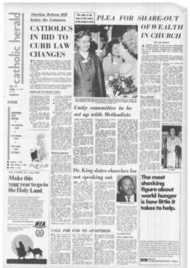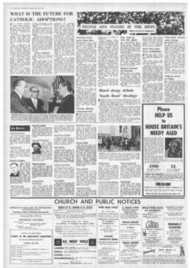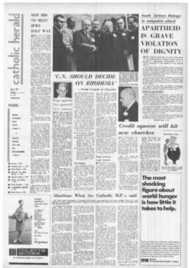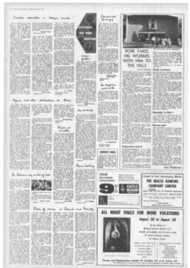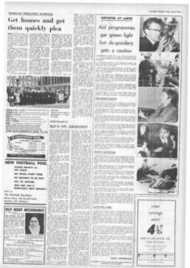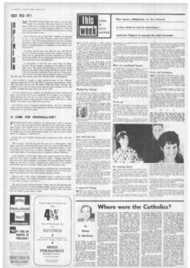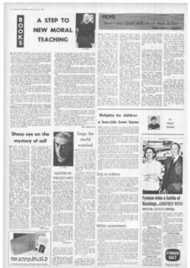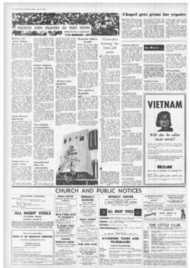Page 3, 22nd July 1966
Page 3
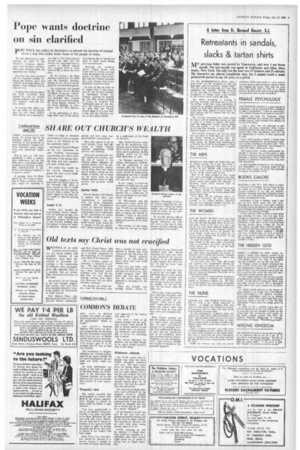
Report an error
Noticed an error on this page?If you've noticed an error in this article please click here to report it.
Tags
Share
Related articles
You Who' Meets A Fr. Basset Cool Reception Fr. Bernard
Cell Which Still Grows
See How It Runs From Name To Name And Strength To Strength
Gentle, Loving, And
Another Tv Confrontation
A letter from Fr. Bernard Basset, S.J.
Retreatants in sandals, slacks & tartan shirts
MY previous letter was posted in Vancouver, and now I am home myself. The last month was spent in California and Ohio, then, finally, New York. The tally for the tour was 17 lectures and 25 retreats. My memories are almost completely rosy, for I cannot recall a more purposeful period in my 25 years as a priest.
ON MY BOURNEMOUTH DESK when I came home was the invitation to write this final letter with the injunction "Keep it light". This last will be no easy tasks for I am what Americans call "pooped". Richest memories of my tour turn on meetings with so many retreatants; in Chicago alone I gave retreats to 300 women and to nearly 800 men.
The retreat movement is thriving in America, especially with those over 35. But in the college world there were expressions of resentment at anything compulsory, especially retreats or daily Mass. Retreat-houses for the young have been opened in many places, in which guitars and hull sessions lead the teenagers to God.
The Cursillo movement has swept across the States, and its leadership courses are seen by some as a threat to retreats. The movement has enthusiastic friends among priests, nuns and layfolk; I met two nuns who had set off with their fleabags, to camp with other potential leaders in a disused barn.
The Cursillo movement also has its critics who say about it much that was said about the Oxford Groups in former days. The retreat-houses are still full, and enjoy diocesan support. In Seattle, both retreat-houses at Tacoma were built by the diocese; in Cleveland, a Lake Shore retreat-house is manned by diocesan priests.
THE MEN
RETREATS FOR MEN IN CHICAGO start on Friday evening. At 6 p.m. the house is empty, but 76 retreatants have driven tip in 75 cars by 6.15. Brother with a hearing-aid serves as traffic warden and, as he listens to no one, all do exactly what he says.
Men of all types struggle to their rooms with grim, coat-hangers, transistors and other essentials; for a while one hears the hum of electric razors and catches the fragrance of pre-shave lotion, nicely blended with the aroma of cigars.
When the bell for the first conference peals the victims emerge in sandals, slacks and tartan shirts. Each has his retreat prayer-book and his napkin ring. Now, there will be unbroken silence for two days. Naturally, the men bring their troubles to the retreat director; interviews may last until midnight; happily, on only one occasion, was I knocked up at 2 a.m.
THE WOMEN
NOT SO MANY WOMEN drove up alone for their retreats, for most were married and Pop and the kids dropped Mom at the convent door. Some of the kids were sad to see her go, but even these admitted frankly that, with Pop in charge for the weekend, an hilarious time would be had by all. Besides, the whole family would come to collect her on Sunday and to inspect her anxiously for any signs of spiritual change.
I found the retreats for women rather more fussy, thanks to the nuns. After avid attendence at conventions, the sisters who man the retreat houses arc itching to put the latest theories into effect.
Where priests and men respect the reforms but apply them nonchalantly, the women retreatants walk in endless processions—Gelineau on the organ—each retreatant, as often as not, carrying an unconsecrated host.
In one place, near New York. the liturgy was hygenic, each communicant bearing her host on a piece of tinfoil, not unlike a milkbottle top. Despite these diversions—women in retreat have orientation meetings, business meetings and liturgical rehearsals—the ladies are as earnest as their men.
The deep desire for prayer and for progress in holiness remains a constant and impressive feature of American Catholic life. We have our retreat-houses, too, and earnest retreatants, but in my opinion they fall behind in genuine piety.
THE NUNS
SISTERS ALL THE WORLD OVER face a time of crisis, a fact clearly observable in America. A change of religious dress may seem a trivial trial to those outside the cloister: it causes great pain to sisters who have served God faithfully for many years, In one congregation, suggested styles and samples of fabric have been circulating since 1963. This particular Order will vote on its new dress, others are commanded from on high. The question is asked in whispers whether curial officials really know much about sisters or the religious life?
Again, so many American nuns today carry theological diplomas in their wallets; they know as much about Catechism as the parish priest Yet when a sister told her First Communion class to masticate the Host, the pastor rebuked her and sent the curate to contradict her "before the kids".
Inside the convents, too, there are certain
irritations. While some sisters are often away at summer schools and conventions, others at home are washing the dishes. They day has gone when any priest may be used as a retreat director; the day is fast approaching when sisters will give their own retreats themselves.
FEMALE PSYCHOLOGY
ONE NOTES IN AMERICA a great interest in psychology; it is not uncommon for a retreatant to open a conversation : "I have an acute inferi. ority complex because I was insecure in youth!"
Indeed, my book We Neurotics, which English Catholics buy secretly and always for another person, went through four editions on its title in the States.
I met a sister who was absorbed in selfhypnosis, and many retreatants whose retreat reading turned on the study of their personality. Sisters back from conventions were hot on the psychology of women, so little understood by men.
Once, when giving a retreat, I heard loud cheers and clapping from the retreatants' refeo. tory. A sister, standing at the door, said : "Now a big hand for Fr. Budweiser", an invitation to which the ladies replied generously.
The young priest, looking embarrassed, explained to me later that he had come to help with the confessions and that female psychology demands a previous confrontation; women feel happier in confession if the confessor has thus been introduced.
A mild feminist movement in the Church is well exemplified in a powerful article in the current Critic, surely one of the best informed journals in the Catholic world.
BOOKS GALORE
PERHAPS I AM NOT THE MAN to touch m this topic but, happily, my own books involve the reader in very little thought. One of the greatest problems of our age for ,teachers, lecturers, informed Christians, including retreat directors, is to find time to read the increasing number of theological books.
Archbishop Young of Hobart, when I met him in New York, made this very point. Throughout my long tour, every spare moment of the day had to be Utilised not, alas, to ponder great problems but simply to keep up wtth the Joneses in the reading of books. For his reason as well as others I made many long journeys by train. The two days from Chicago to Vancouver were consumed in reading Bartin Buber; from Vancouver to Davis, California, I took notes on four books by Paul Tournier, Ratner, Kung, Congar, etc., for all one's efforts, are still many volumes ahead. I found in the States that many aspiring eggheads live under similar pressure. I thought with envy of David Ogg, my tutor at Oxford, who, when asked a question replied: "That is off my subject; I specialise on the Salt Tax" and left it at that,
THE HIDDEN GOD
WHEN I LANDED IN NEW YORK last January, friends were speaking warmly of an article in America by Fr. Charles Davis, entitled "The Hidden God". No copy of the paper was then available, and my time was short.
In Chicago, scores of people mentioned the same article, but by then that particular issue had disappeared. I had to go to Vancouver to read Fr. Davis, for the Cenacle nuns in that city had so admired his words that they had reproduced them on the convent jelly-pad.
It was a short article in very moving, exactly summing-up the cravings of the present Catholic world. At the time of writing Fr. Davis may have been touring America with a theological circus; there were many experts on the circuit then.
Fr. Davis merely pointed to the danger of using religion as an escape from God Himself. Much preoccupation with reforms. liturgical, ecumenical eatechetical, could be an attempt at such an escape. The author found that many Americans asked to be led to God and that theologians, if their hearts are empty, prove of little use.
I would not for a moment imply that our current experts are in any way lacking, but one of them has had the courage to point out the crying need. .My conclusions were similar. In the Critic, already quoted, Dan Hirr, the Catholic Malcolm Muggeridge of Chicago, almost coins the slogan "Theologians go home".
WRONG KINGDOM
AN AMERICAN called at the British Consulate in an American city to ask for a Mr. X. "1 am sorry", answered the secretary, "but Mr. X departed for the United Kingdom yesterday." Said the visitor sadly: " I am sorry to hear that. Would it be too late to send a wreath?"
blog comments powered by Disqus


